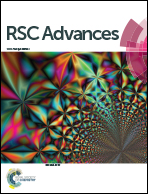Pyridine- and pyrimidine-functionalized poly(sulfone)s: performance-enhancing crosslinkers for acid/base blend proton exchange membranes used in direct methanol fuel cells†
Abstract
The direct methanol fuel cell (DMFC) is a promising energy conversion device that holds the potential to replace lithium ion batteries used in portable electronic devices. At present, widespread commercialization is impeded in part by the absence of a suitable proton exchange membrane (PEM). To address this need, pyridine- and pyrimidine-functionalized poly(sulfone)s (PPS and PMPS, respectively) were prepared in two high yielding post-polymerization C–H borylation/Suzuki coupling steps from commercially available UDEL® poly(sulfone). Membranes comprised of the aforementioned polymers blended with sulfonated poly(ether ether ketone) (SPEEK) were found to exhibit improved single cell performance and decreased methanol crossover in comparison to plain SPEEK and showed higher power densities than Nafion® 112, an exchange membrane commonly used in DMFCs. Blend properties and single cell performances were found to be dependent on the basicity and steric parameters of the N-heterocycle incorporated into the polymeric material used in the aforementioned membranes.


 Please wait while we load your content...
Please wait while we load your content...